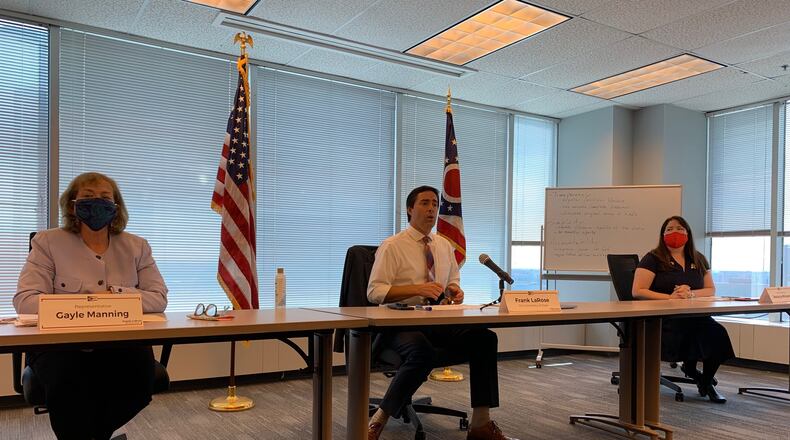Manning and Miranda introduced the bill July 27, less than a week after federal prosecutors brought racketeering charges against former Ohio House Speaker Larry Householder, R-Glenford, and four other men.
The five are accused of taking $60 million from an energy corporation and its affiliates to elect pro-Householder legislators so he could return as House speaker and then pass a $1.3 billion bailout bill that helped Akron-based FirstEnergy, according to the federal criminal complaint.
Miranda said it’s time to reign in the “wild, wild west of dark money” in Ohio politics and Manning said the ability to follow the money gives Ohioans a better idea of what’s going on in politics.
LaRose said the bill seeks to inject accountability, simplicity and transparency into the practice of independent groups spending cash to influence Ohio politics.
#MasksOnOhio @FrankLaRose talks campaign finance reform with Reps Jessica Miranda and @GayleManningOH pic.twitter.com/5ZRnMN4r86
— Laura Bischoff (@lbischoff) August 3, 2020
The legislation calls for:
- Requiring registration of groups working in favor and opposed to referendum or initiative petitions.
- Aligning state law with the U.S. Supreme Court decision in 2010 in Citizens United to allow corporations to make independent expenditures and require spending and contribution reports.
- Mandating campaign finance reports for nonprofit groups that spend money to influence a candidate and issue campaign.
- Giving the Ohio Secretary of State subpoena power to look at bank records and related documents.
- Requiring federal political action committees to file campaign finance reports in Ohio.
“A bill like this can pass if we can get it done by the end of the year because of what’s happened. The public will be calling and emailing their legislators and that will put pressure on them to make sure that Rep. Miranda and I can get this accomplished,” Manning said.
The bill is modeled after Senate Bill 240 — legislation carried by Republican Jon Husted 10 years ago that did not make it into law.
Manning said her son, state Sen. Nathan Manning, is sponsoring a companion bill in the Senate.
Other reforms pushed by LaRose have stalled, including online applications for absentee ballot requests, permission to include postage paid for return absentee ballots and moving the deadline to request an absentee ballot to allow for more processing time.
LaRose said he expects the November general election will see the highest voter turnout in Ohio history and the rates of voting early and by absentee ballot will double.
Those factors mean county boards of elections will need more personnel and equipment to process absentee ballots and it may take longer to release election results, he said.
About the Author

